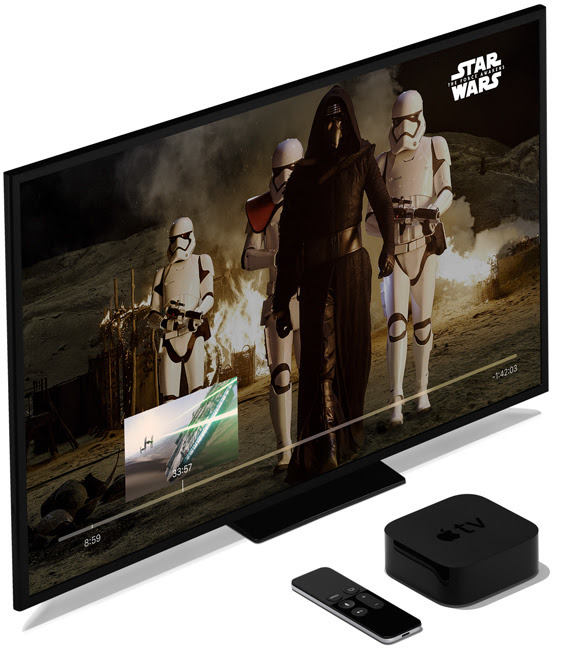Apple's iTunes will probably be a first-choice destination if and when studios and exhibitors finally agree on a window for "premium" video-on-demand — that is, streaming while a movie is still in theaters, according to a report.
This is because they'd likely rather place their trust in a service they already partner with, sources told Business Insider. iTunes also typically gets the first crack at digital home viewing, including rentals and downloads.
"If an earlier window gets put in place, iTunes would probably have some say in being part of the earlier window," one source commented.
A senior box office analyst with Exhibitor Relations, Jeff Bock, argued that iTunes would be the "logical choice," since "it's what everybody has." He further suggested that Screening Room — a service founded by Napster creator Sean Parker, with stakeholders like Steven Spielberg, J.J. Abrams, and Peter Jackson — is liable to be cut out of the PVOD segment "if the price point is right," since nobody automatically needs the company and it will have to play catch-up with infrastructure.
In December a report said that Apple was actively pursuing early-access streaming in talks with studios. Now as then, though, the main issue is when to allow PVOD after a movie's premiere. The minimum is liable to be after the first two weeks, since that's when both studios and exhibitors reap most of a film's revenue.
There are also concerns about increased piracy, and it's possible that PVOD could be relegated to "the dark zone," the period during which movies are out of most first-run theaters but aren't yet on disc or online. As things stand, theaters normally have a 90-day exclusivity on new titles.
Another unresolved problem is pricing. While Screening Room has been angling for $50 — to be split with studios, distributors, and theaters, and including a bonus pair of theatrical tickets — Fox and Warner Bros. have reportedly been considering $30, with the downside of a longer 30-day wait. Disney, a close Apple partner, has allegedly been resistant to offering PVOD at all, likely because it owns major franchises such as "Star Wars" and the Marvel films, which often enjoy long theatrical runs.
 Roger Fingas
Roger Fingas







-m.jpg)






 Mike Wuerthele
Mike Wuerthele
 Malcolm Owen
Malcolm Owen

 Amber Neely
Amber Neely
 William Gallagher
William Gallagher





-m.jpg)






17 Comments
I would pay $30 if I could see a movie like "Wonder Woman" in 4K res, 2 weeks after theatrical release. It's what it would cost me for 2 people and Fandango fees.
Day-and-date will kill the theatrical business. Once theaters go under, all movies will become the cultural equivalent of "direct to video". Once you have that, with very few exceptions, budgets will crash and you can say goodbye to all these big-budget extravaganzas (not that that would necessarily be a bad thing). Have we learned nothing from what's happened to the music business, which is now a third of its former peak size in the U.S. (adjusted for inflation)? When was the last time a culturally significant album was released? The perception that music is worth little to nothing as well as first the move from albums back to singles and now from listening to specific songs to listening to programmed streams has destroyed the music business. The same thing will happen to the movie business.
Go onto Netflix or another movie streaming service. Where there are always a few big "seeds", most of the movies are the equivalent of b-movies of the 1950's-1980's - movies made cheaply overseas that are intended to confuse consumers into thinking they're better known movies. This is what the movie industry will become if we go day and date.
Unless you have a multi-million dollar home theatre that looks like Radio City Music Hall, you cannot replicate a quality theater experience in the home (and maybe not even then). You might have an experience that's "good enough", but it's not the same. And then there's the difference between seeing a movie with three people and seeing a movie as a group experience. I would maintain that the original Star Wars would not have been as successful and culturally significant as it was if it hadn't played in large movie theaters (many large 70mm theaters) where many people saw the film with a thousand other people. Certain experiences are meant to be shared. Rock concerts and popcorn movies are among them. If you live in a small town and all you have is a badly run cinder-block movie theater with lousy projection and sound, I can understand why one would prefer to stay home. But if you've got decent facilities, like the large screen formats or a good Dolby Vision theater, that's a far better experience, IMO.
Certainly there's wonderful convenience to being able to watch almost any film at any time for relatively low cost and in quality unattainable 15 years ago. But we shouldn't kill the theatrical industry in the process. Don't like theaters? Then wait a little longer. It's bad enough that windows are already down to 90 days. It wasn't that along ago that home video had to wait a year or more.
And still no resume playback for iTunes, which was available on SoundJam MP 2.5.3, from which iTunes was developed in 2001.